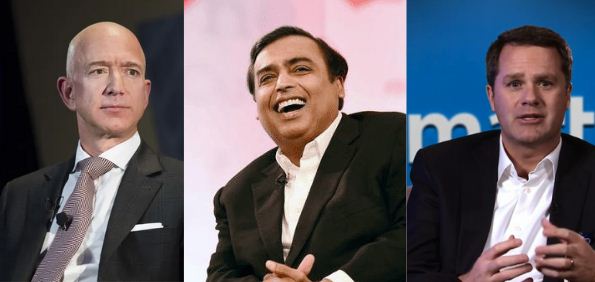India’s e-commerce market is poised to reach $99 billion by 2024. As the Indian e-commerce market is skyrocketing towards its potential, the competition between Amazon, Flipkart (a subsidiary of Walmart ), and Reliance is catching heat. Reliance, which is the one fully Indian brand in the race, is slowly succeeding despite the unethical trade practices by the multinational giants.
Reliance to open its first 7-Eleven store in Andheri
Reliance Retail Ventures Ltd, a subsidiary of Reliance Industries Limited is all set to launch its own chain of 7-Eleven convenience stores in India. The company has entered into a master franchise agreement with 7-Eleven Inc. (SEI) to launch its convenience stores in the country. A master franchise agreement is a type of agreement in which a company (7-Eleven Inc. in this case) gives the right to other companies (Reliance Retail Ventures Ltd. in this case) to open a new outlet in a given area.
In its stock-exchange filing, RIL informed –“The first 7-Eleven store is set to open on Saturday, October 9 in Andheri East, Mumbai. This will be followed by a rapid rollout in key neighborhoods and commercial areas, across the Greater Mumbai cluster to start with”. The company further informed that the outlets will provide customers with a range of snacks, beverages along with refilling of daily essentials.
Reliance replaces future group as a partner for 7-Eleven
Interestingly, the development comes after Future Group announced its intention to terminate the Master Franchise agreement with 7-Eleven. The two-year-old agreement did not reach its targeted potential, as Future-7 was unable to meet its target of opening the stores and paying the franchise fees. In fact, even before the opening of their first store, the agreement failed to fructify and the partners were incurring a cumulative loss of 17.3 crores,
In August 2019, Future group had entered into an agreement with Amazon according to which Amazon became a stakeholder of 49 per cent of total shares of future coupons, a promoter group entity of Future Retail. At that time, Future coupons held 7.3 per cent shares of Future retail. The deal entitled amazon to hold 3.58 per cent of Future retail’s shares.
Future-Reliance-Amazon battle
In, August 2020, the Future group had agreed to sell its retail, wholesale, logistics, and warehousing businesses to Reliance Retail. The deal, which was worth over a whopping Rs 24,713 crores posed a big threat to Amazon, which had invested in India intending to establish its monopoly over the country’s e-commerce sector.
Amazon decided to challenge this deal in Indian courts, and after various rounds of legal battles through Singapore International Arbitration Centre (SIAC), Delhi High court, Security and Exchange Board of India (SEBI), National company law tribunal (NCLT), and the Supreme Court of India, the deal between Reliance and future was validated and the Future group was given a legal backing to go ahead with their Reliance deal.
Multinationals misusing Indian laws to garner profits
Amazon and Walmart have been constantly abusing Indian laws to expedite their profiteering motives. Both companies have been under probe by the Competition Commission of India for anti-competitive practices and predatory pricing. Investigations are underway on Amazon for being accused of bribing Indian officials and floundering norms which were aimed to protect Indian small retail shop owners.
Read more: Amazon has made its greatest mistake in India and is now paying for it
Reliance, a thorn for Amazon’s dream in India
Ambani-led Reliance Industries limited has an unequalled grip on the Indian retail market. In September 2020, it had 11,931 stores including neighborhood stores, supermarkets, hypermarkets, wholesale cash and carry stores.
In an attempt to capitalise on its base of retail stores, the company launched Jio-mart which is scaling up rapidly in terms of daily orders. Jiomart has expanded its foothold in fashions, mobile accessories, electronics, jewellery, which are one of the most consumer-pulling segments for traditional e-commerce giants like Amazon and Walmart.
The opening of 7-Eleven stores by Reliance is just the beginning of the long road of indigenisation of the Indian e-commerce sector. Furthermore, it can also act as a warning to other multi-national giants looking to invest in India, to keep national interests above any of their goals.
